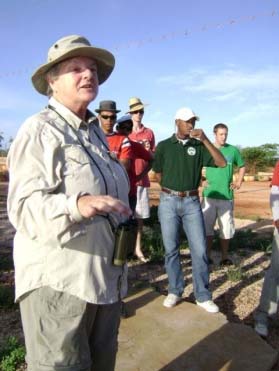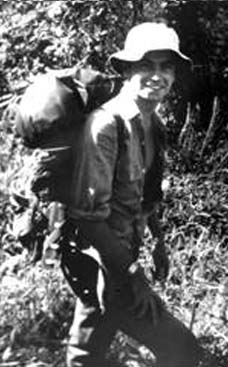
Former Peace Corps volunteer and ornithologist Kate Wallace is waiting for me in the central park by an SUV loaded with five-gallon bottles of water and camping equipment. Wallace will be spending the night on the beach along with thirty youth from Pedernales, Jimaní, and Villa Jaragua and their Peace Corps leaders after a day of exploration, wilderness education and cleanup. The weekend-long event is a collaborative effort on the part of several non-governmental organizations and non-profit community groups aimed at teaching the young Dominicans to appreciate and protect this lush, diverse frontier at a time when their country’s development relies heavily on tourism, but often at a higher social and environmental cost than the individual communities can bear.
Alexander Pope writes: Returned Peace Corps volunteer and ornithologist Kate Wallace promotes eco-tourism in the Dominican Republic
Eco-tourism: the edge of nowhere
Caption: Ornithologist Kate Wallace teaches the youth how to distinguish the many different types of birds found in this important ecosystem.
Part 1: Cabo Rojo
Picture Gallery: The edge of nowhere: Cabo Rojo
PEDERNALES.- “Where are you going at this hour? You should be asleep.”
It’s six a.m. on a Saturday in Pedernales, a quiet, dusty town of 18,000 on the southwest coast of the Dominican Republic that joins Haiti via a gated footbridge over a chalky river. Sunrise is still another hour away, and the stars are clear and diamond-hard in a sky just beginning to lighten. A woman watches me from the shadows beyond the glow of an orange streetlamp, wrapped in a heavy printed dress, one hand on her hip, the other steadying the tightly packed bundle of clothing balanced on her head. She has a point, I think – it’s been a long time since I last saw this side of the dawn, and my eyes are still bleary with sleep – but we both have our reasons.
I’m going to Cabo Rojo, I tell her, and later to the famous Bahia de Las Aguilas – the Bay of Eagles. She nods and gives a small hum of approval before moving silently off into the darkness.
Former Peace Corps volunteer and ornithologist Kate Wallace is waiting for me in the central park by an SUV loaded with five-gallon bottles of water and camping equipment. Wallace will be spending the night on the beach along with thirty youth from Pedernales, Jimaní, and Villa Jaragua and their Peace Corps leaders after a day of exploration, wilderness education and cleanup. The weekend-long event is a collaborative effort on the part of several non-governmental organizations and non-profit community groups aimed at teaching the young Dominicans to appreciate and protect this lush, diverse frontier at a time when their country’s development relies heavily on tourism, but often at a higher social and environmental cost than the individual communities can bear.
Pedernales is a place out of time – a woman can walk alone in the dark, the streets are swept clean of trash, no car horns interrupt the cool, pre-dawn peace. Instead, roosters announce the hour as the youth begin to arrive, dragging their rolled sleeping bags and backpacks, silent with exhaustion until they see their friends and break off into small chattering groups on the park benches and concrete flower beds. Wallace, a petite, lively woman in her 60s, springs into action, distributing plastic cards with illustrations of indigenous wetland birds on them. The three Peace Corps volunteers who co-organized the event take attendance and compare notes on sleeping and eating arrangements. The youth are divided up into four groups and asked to introduce themselves to someone from another city; together they come up with group names like Old Guagua and We Don’t Even Have Potatoes, and the cheer that will later echo back and forth between them: “Gimme, gimme!” “Take it, take it!”
The sun is visible above the rooftops as we pile gear and people into the backs of two pickup trucks. Also with us are two Colombian volunteers from the Organization of American States, a Chilean couple who have recently arrived in Pedernales to work with Plan, an organization building Dominican-Haitian solidarity on the border, and interpreters from the Pedernales Association of Nature Guides (Aguinape). Our knees are driven into our chins as we bounce over ruts in the road out of town. “Gimme, gimme!” shouts a young man perched on the tailgate. “Take it, take it!” comes the reply from the other truck, then laughter.
The mountains of the Sierra de Bahoruco stretch endlessly west to east, parallel with the highway, looking like the crumpled skin of an ancient serpent in the sharp relief of the morning light. Hundreds of yellow and white butterflies float up from the prickly underbrush alongside the road. By midday, the mountains will be little more than shadows crowned with the heavy rain clouds that have allowed a wetland to flourish in this most improbable of landscapes, where the desert falls suddenly into the Caribbean Sea.
People would pay big money for this view, and the privilege of swimming in some of the cleanest, clearest, warmest waters in the world. Hotel developers are counting on it, and to an extent so are the people of the southwest, one of the poorest regions in the country. But organizations like Aguinape are worried that developing conventional tourism infrastructure could have disastrous consequences for this rare and fragile ecosystem. 28 species of indigenous birds can be found in the wetlands of Cabo Rojo. The surrounding desert is home to 2 species of iguana. Endangered sea turtles come to lay their eggs on the beaches of Cabo Rojo and the Bahia de Las Aguilas, and pelicans roost in the petrified coral cliffs along the coast.
With large numbers of tourists come spinoff revenues for the host community, but also pollution, drugs, prostitution, and crime. Aguinape believes there is another way to develop Pedernales without destroying it, a way that will give the locals more control over the fate of their town and the amazing wilderness that envelopes it.
It starts with the shell of an interpretive center set back from the water’s edge at Cabo Rojo beach, our second stop of the morning after hearing a talk by Kate Wallace beside a mangrove pond. Crabs scuttle across the sand, distracting the students as an Aguinape interpreter tells them about the organization’s vision for the center. Ideally, tourists will be able to drive or take motoconchos here from Pedernales, take a swim, talk to interpreters about the geography and history of the region, and get information on guided tours and sightseeing opportunities offered in the area’s two massive national parks, Sierra de Bahoruco to the north and Jaragua to the south.
This kind of tourism development is called eco-tourism, and it will necessitate the hiring and training of guides and park wardens, the repairing of roads, the construction of new hotels and restaurants in the town itself, and the expansion of the existing transportation infrastructure, all of which will mean Pedernales could prosper from its natural environment while ensuring its protection for future generations – like the youth now examining seashells and wading at the water’s edge.
A breakfast of cheese and crackers and juice is served in the back of one of the trucks, and then it’s time to go. The sun is climbing high now, and wisps of cloud are beginning to slide down the mountain slopes. Our next stop is the village of Las Cuevas de Jaragua, where we will take lanchas (motorboats) to the Bahia and experience a side of the Dominican Republic few have seen. Battle lines have been drawn between those who would like to keep it that way and those who would have it opened to the world, but the human future of Pedernales depends on a balance between the two.
Author:
Alexandra Pope













